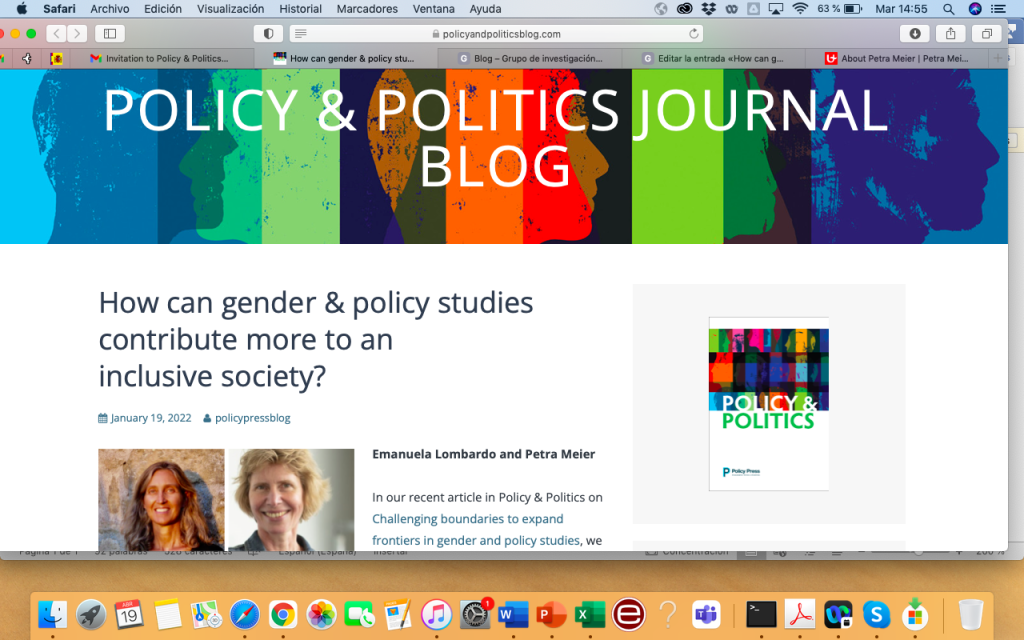How can gender & policy studies contribute more to an inclusive society?

In the blog in Policy & Politics How can gender & policy studies contribute more to an inclusive society? – Policy & Politics Journal Blog policyandpoliticsblog.com about the recent article by Emanuela Lombardo and Petra Meier on Challenging boundaries to expand frontiers in gender and policy studies, we explore how gender & policy studies can contribute more to an inclusive society. We know from research that many issues have different effects on men and women. Such “gendered” phenomena include:
- violence
- economic precarity
- lack of transportation
- level of schooling
- poverty
- health
- bodily autonomy
- participation in elections and politics
Gender & policy studies investigate the design, implementation and effects of public policies tackling these and other problems that societies face.
Gender & policy studies offer excellent critiques of what is wrong with society and even with the very policies trying to reduce inequalities. Often, it is feminist and other civil society actors who bring problems to the attention of public opinion and policymakers. Disputing social problems in public debates – known as contestation- is the way to transform unequal gender relations. It creates opportunities for putting new perspectives and solutions on the agenda.
But policies generating more gender-equal solutions do not get adopted without resistance. Indeed, contestation is inherent to gender equality policies. This contestation by politicians, opinionmakers and others who disagree with equality policies identifies a crucial point. Policies, be they gender equality policies or not, imply a set of given gender relations, define what meanings gender equality should take and what gender roles are legitimate. They codify the power relations between individuals of different genders.
While feminists aim for a progressive definition of such relations, others defend the opposite position. Hence the struggle. While the increasing opposition against gender equality by anti-gender and radical right actors is worrisome, it could also strengthen gender & policy studies. How would that work?
Such struggles for gender & policy studies could help to improve the field. We think that gender & policy studies need to reflect more explicitly on power, if they do not themselves wish to reproduce unequal relations within the discipline and also in the research they conduct. We need to understand more systematically the intersectional aspects of policies: how gender-based hierarchies interact with race, class, sexuality and other inequalities. Intersectionality offers inclusive policies that allow societies to adapt to the diversity of people’s needs. As one example, a greater cooperation of gender with LGBTQI+ and critical race studies could foster a more intersectional approach in gender & policy studies.
While anti-gender approaches threaten the legitimacy of gender & policy studies, they also push us to question the definition of gender expertise. Gender & policy studies could benefit from being more diverse in themselves. Mere calls for research diversity in the field are not enough. The plurality of gender & policy approaches allow us to observe policy problems from different angles.
We need to value such plurality, recognizing that each offers a relevant but only partial view of the same issue. Even more important is the need to broaden our scope to colleagues from Latin America, Asia, Africa, and the Middle East to reach beyond the predominantly English-language hegemony and privileges. The field thus faces the challenge to critically reflect upon its own degree of inclusiveness and diversity so as to become more relevant.
While gender & policy studies are very good at critiquing problems, explicit reflection on how society could or ought to look has been relatively neglected. Positive projects on how society should evolve and what it should look like from a gender equality perspective are dearly needed. They would not only be useful for society, but could also help to push the frontiers of gender & policy studies towards becoming more inclusive.
We see two recent phenomena that could be helpful in this respect. Firstly, opposition to gender equality and recent attacks on democracy suggest the importance of exploring the relationship between democracy and equality. Democratic backsliding in the form of radical right populism, anti-gender movements, and broader opposition to gender equality negatively affect women’s and minorities’ rights and equality policies achieved through many years of struggle. Central feminist issues such as sexual autonomy, freedom from gender violence, economic equality, care equality, and women’s equality in politics are under threat.
The imperative becomes not only to investigate how democratic backsliding affects gender equality, but also to develop new, positive, more inclusive visions of society, politics and policy. The second phenomenon gender & policy studies scholars could use as an opportunity for progressing are major crises, such as the 2008 financial crisis, the Covid-19 crisis, and the Climate Change crisis. While researchers have extensively documented how such crises are gendered, the real challenge for gender & policy studies consists of proposing new, positive, and more inclusive visions of the world in the context of these crises.
You can read the original research in Policy & Politics:
Lombardo, Emanuela; Meier, Petra (2022) ‘Challenging boundaries to expand frontiers in gender and policy studies‘, Policy and Politics DOI:
https://doi.org/10.1332/030557321X16309516650101